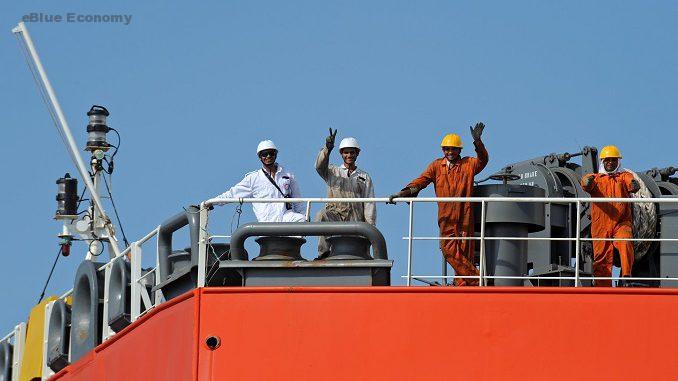The Case Study reports that on the evidence, there is an ongoing legal dispute between both the current and previous ownership of the vessel
London.UK. Human Rights at Sea was contacted in mid-May by the Master of the MV Gulf Sky (IMO 150377) flying the flag of Dominican Republic currently anchored off Port Khor Fakkan Anch, UAE, who on behalf of the crew, raised serious concerns about the welfare of the seafarers and the financial hardships that they are subject to given the three months delay in their wages, as well as their living conditions onboard including periodic re-supply of essential victuals.

eBlue_economy-MVgulf -S
Following the Master and crew’s request, the Charity conducted an investigation, and in this Case Study reports on the findings as disclosed on a voluntary basis at the time of writing by all stakeholders involved and who have responded to the charity’s enquiries.
Case Study reports
The Case Study reports that on the evidence, there is an ongoing legal dispute between both the current and previous ownership of the vessel which appears to have added to the already challenging situation for the seafarers on board during the global pandemic.
The Master, on the behalf of the crew, has voluntarily disclosed to Human Rights at Sea communications in relation to the case as between the crew and the owners, managers, DPA, P&I, the manning agency, the port authority and the flag State. The Case Study reflects the information the HRAS research team has collated from all stakeholders including those who were contacted by HRAS to provide an official response.
Serious concerns on the inadequate
The Case study reports on the serious concerns on the inadequate supplies onboard in relation to food, fresh water, fuel, hygiene conditions, medical supplies and lack of PPE. Many members of the crew have families with children and elderly parents who are depending on them financially and are now struggling to make ends meet, resulting in them having to take out burdensome loans.
The manager of the vessel who was contacted by Human Rights at Sea stated that the seafarers must show patience and understanding during the global pandemic in relation to their request for repatriation and payment of salaries. He assured Human Rights at Sea that the company intends to repatriate those who wish to be when lockdown eases and flights are reopened. On the issue of the claim of outstanding wages, the company has acknowledged delay in paying and has justified this as a ramification of the COVID-19 disruption on the banking sector.
The Dominican Maritime Administration was immediately notified of the situation after having been contacted directly by the Master and crew. Human Rights at Sea additionally independently contacted the Administration to request their official position on the received complaint.
Seafarers on board the vessel
The Administration reverted promptly confirming that their highest priority is the welfare of the seafarers on board the vessel, encouraging Human Rights at Sea’s role in raising awareness on the situation onboard. In response to the complaint filed by the crew, the Administration initiated the procedures set forth in the Commonwealth of Dominica’s On Board Complaint Procedures, which entails that the vessel’s owner/operator has until 28 May 2020 to pay outstanding wages and address the crew’s grievances.
The Case Study also reports on the positive engagements from the Port Authority and UAE Government reflecting increased transparent engagement with Human Rights at Sea on the matters raised.
Noting the ongoing challenges and restrictions resulting from the COVID-19 pandemic, the current Case Study once again highlights the issues faced by seafarers moving 90% of the world’s goods from what are often standing problems crew face when salaries, provisions and management communications are disrupted.
Human Rights at Sea continues to engage with all stakeholders in this matter, and will continue to both track and publicly highlight the issues raised, as well as the outcome reached














